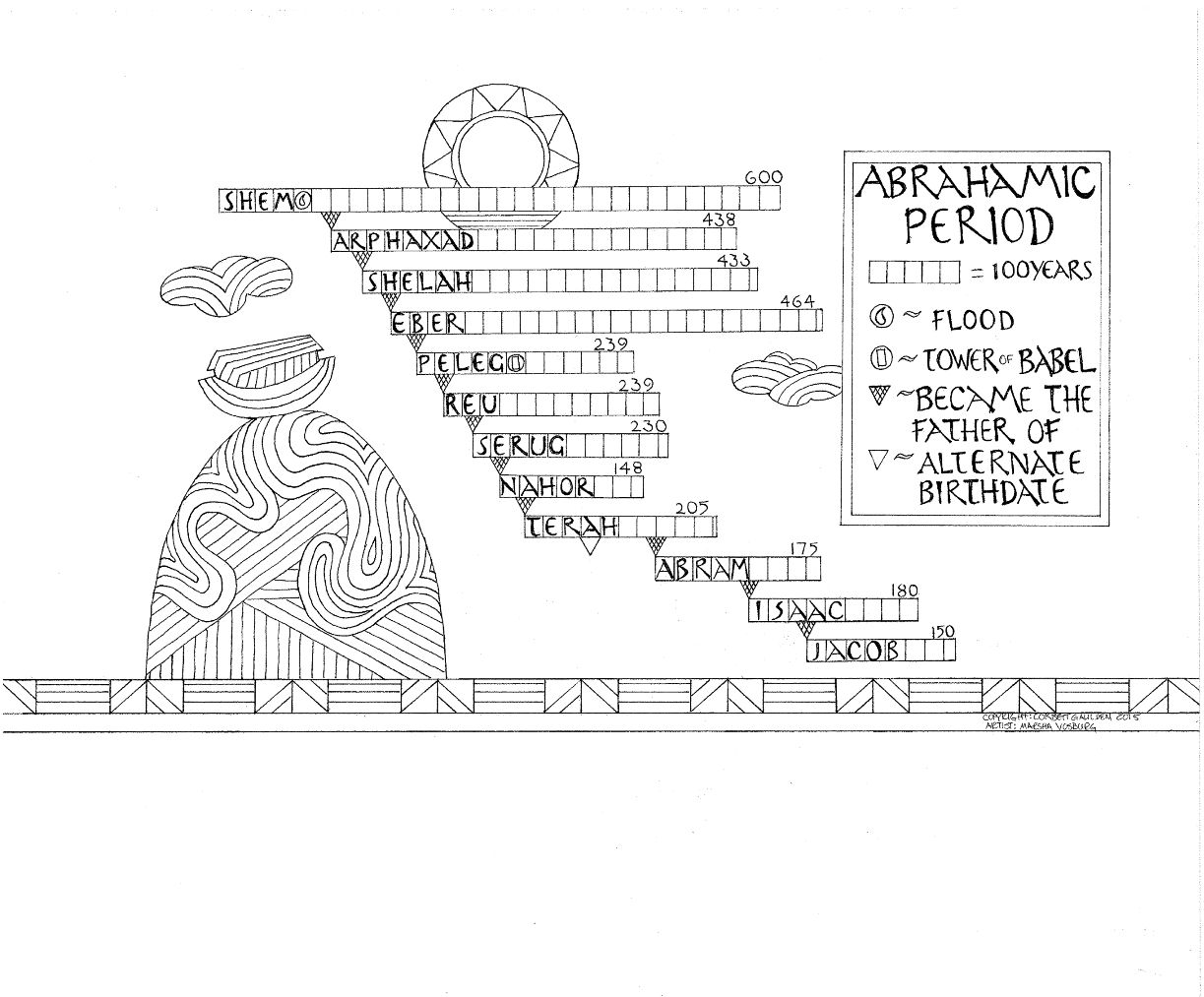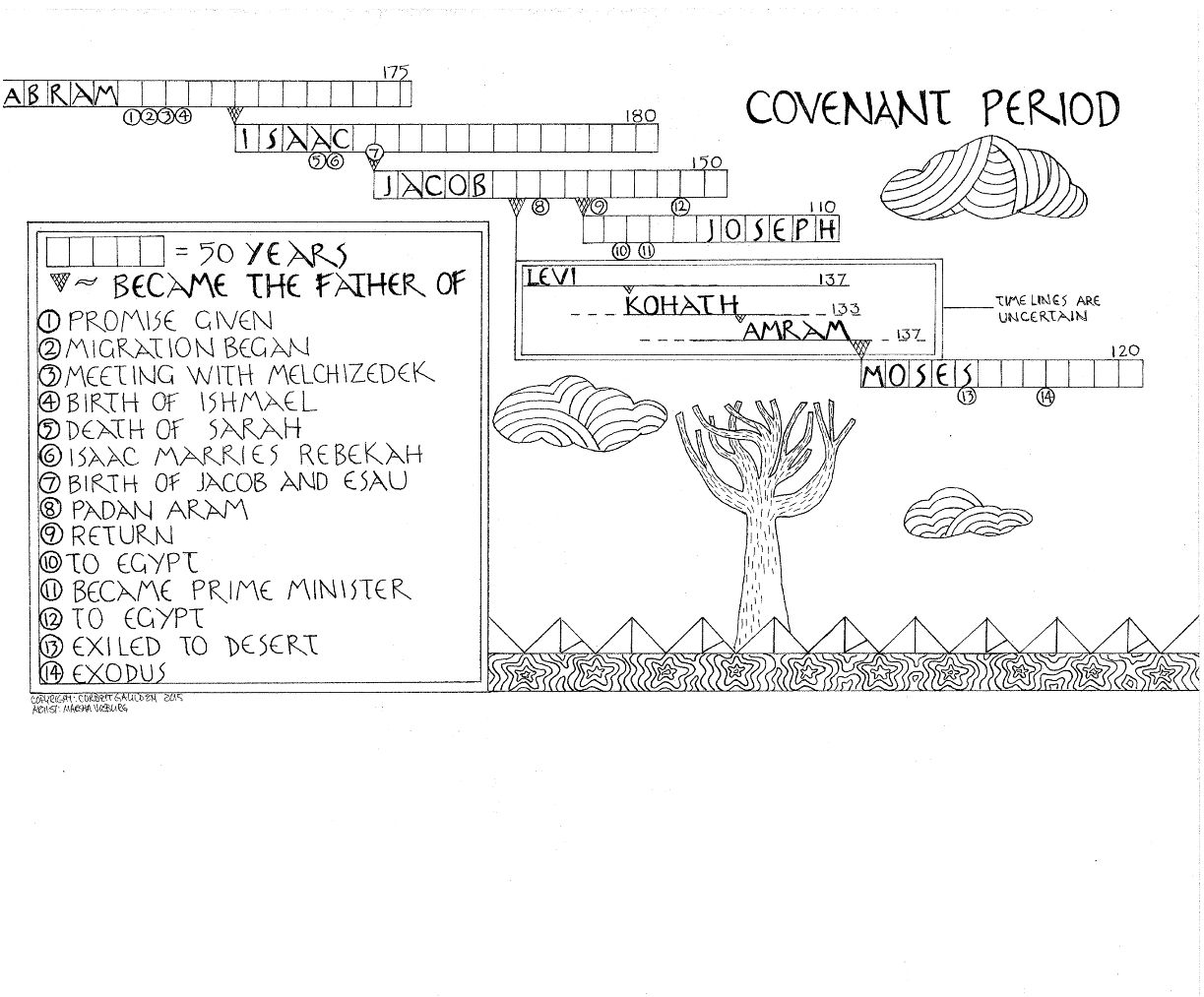PERSONAL NAMES IN GENESIS 12-50
The most important personages in the patriarchal narrative are listed below. Some people have indicated that it would be interesting to know how to pronounce their names. For that reason, we have provided a pronunciation guide for each name. Soon, we hope to add an audio version of the guide for each name so the user can pronounce the name along with the author. The audio guides will be presented along with the appropriate name below.
Click here for a video that explains some basics about pronunciation and spelling of biblical Hebrew names.
Under construction, appearing soon.
All these very interesting people occurred in a particular historical context. Some of us find it interesting to see that context and grasp how the various people appeared in the overall history of the era. The two links below look at the era from two different perspectives. In the first visual presentation, we will look at the historical time frame leading up to the founding of the nation. We will “locate” Abraham in time relative to the universal flood and the building of the Tower of Babel.
In the second illustration, we will link the time of Abraham to the subsequent history of his descendants down to the exodus from Egypt.
As it becomes important to do so, we will add other supporting material related to the identity of the patriarchal personages to this page. Stay in touch to have access as these things develop.
THE NAMES
While virtually all names have some root meaning in the language of their origin, the meanings are often forgotten over time with the use of the name. The form of the name sometimes morphs as it moves along with changes in the locations in which the name is used. It is the case that all the names of the characters who played some role in the Patriarchal story were derived from some underlying meaning in the Hebrew language or the Egyptian language. Some scholars make a lot out of this and, in some cases, alternate meanings for some names have been suggested. For this work, we will use the meanings of names as found in standard, time-honored sources such as Strong’s Concordance. Whether the names of persons are in some sense prophetic, they are often at least descriptive. When more than one common pronunciation is presented the underlined form is closest to original.
The birth order for the sons of Jacob are presented thus: (number, letter, number) indicates the textual birth order for the sons of Jacob, the first letter of the name of the birthmother of the son, and the birth order for that mother. For example, (11, R ,1) means the eleventh son who was the first from the womb of Rachel, who was Joseph. For this usage, the mothers are specified as: L = Leah, R = Rachel, B = Bilhah and Z= Zilpah.
ABRAM – exalted (great) father; [Strong’s 0087]; av-ROM or ab-ROM
ABRAHAM – father of a multitude; [Strong’s 0085]; av-ra-HOM or ab-ra-HOM
SARAI – princess (implies rule); [Strong’s 8297]; sa-RAI
SARAH – princess (noblewoman, implies nobility); [Strong’s 8283]; sa-RAH
ISHMAEL – God will hear; [Strong’s 3458]; yee-shma-ELL
HAGAR – may mean “flight” (not a Hebrew word); [Strong’s 1904]; ha-GAWR
KETURAH – incense; [Strong’s 6989]; k’-tu-RUH
ISAAC – he laughs; [Strong’s 3327]; yits-KHAWK
REBEKAH – ensnarer; [Strong’s 7259]; RIV-kaw or RIB-kaw
ESAU – hairy; [Strong’s 6215]; e-SAWV
JACOB – “heel holder” or “supplanter”; [Strong’s 3290]; ya-ah-KOB
ISRAEL – “God prevails” or “prince with God”; [Strong’s 3478]; yis-ra-ELL
LABAN – white; [Strong’s 3837]; la-VON or la-BON
LEAH – weary; [Strong’s 3812]; lay-AW
ZILPZH – a trickling; [Strong’s 2153]; ZEEL-pah
RACHEL – ewe; [Strong’s 7354]; ra-KHALE
BILHAH – troubled one; [Strong’s 1090]; beel-HAH or BEEL-ah
The sons of Jacob are presented in birth order. (1, L, 1) tells us that Reuben is the first son and is the first son from the womb of Leah.
REUBEN – see, a son; [Strong’s 7205]; r’-oo-VANE or r’-oo-BANE (1, L, 1)
SIMEON – heard (adjective); [Strong’s 8095]; sheem-OWN (2, L, 2)
LEVI – joined to; [Strong’s 3878]; lay-VEE (3, L, 3)
JUDAH – one who is “praised”; [Strong’s 3063]; ye’hoo-DAH or ye’-HOO-dah (4, L, 4)
DAN – a judge: [Strong’s 1835]; DON (DAWN) (5, B, 1)
NAPHTALI – wrestling; [Strong’s 5321]; noph-taw-LEE or noph-TAW-lee (6, B, 2)
GAD – troop; [Strong’s 1410]; GAWD (GOD) (7, Z, 1)
ASHER – happy; [Strong’s 0836]; aw’-SHARE (8, Z, 2)
ISSACHAR – there is recompense; [Strong’s 3485]; yee-saus-KAWR or yee- sau-KAWR (9, L, 5)
ZEBULUN – exalted or dwelling; [Strong’s 2074]; zev-oo-LOON or zeb-oo-LOON (10, L, 6)
JOSEPH – Jehovah has added; [Strong’s 3130]; yo-SAFE (11, R, 1)
ZAPHNATH PANEAH – treasury of the glorious rest (Egyptian name of Joseph); [Strong’s 6847]; tsof-NOPH puh-NAY-och
MANASSEH – causing to forget; [Strong’s 4519]; men-NAH-sheh or men-nah-SHEH
EPHRAIM – I shall be doubly fruitful, double ashheap; [Strong’s 0669]; ef-RAH-yim
DINAH – judgment; [Strong’s 1783]; DEE-nah or dee-NAH
BENJAMIN – son of the right hand; [Strong’s 1144]; bin-yah-MEAN (12, R, 2)
MELCHIZEDEK – my king is righteous; [Strong’s 4442]; mal-key-TSEH-dek
SHECHEM – back or shoulder; [Strong’s 7927]; SHEK-em
HAMOR – male donkey; [Strong’s 2544]; kham-ORE
ASENATH – belonging to the goddess Neith (Egyptian name; Joseph’s wife); [Strong’s 0621]; aws-NOTH wife of Joseph
ABIMELECH – my father is king; [Strong’s 0040]; ab-ee-Mel-ek or av-ee-MRL-ek

